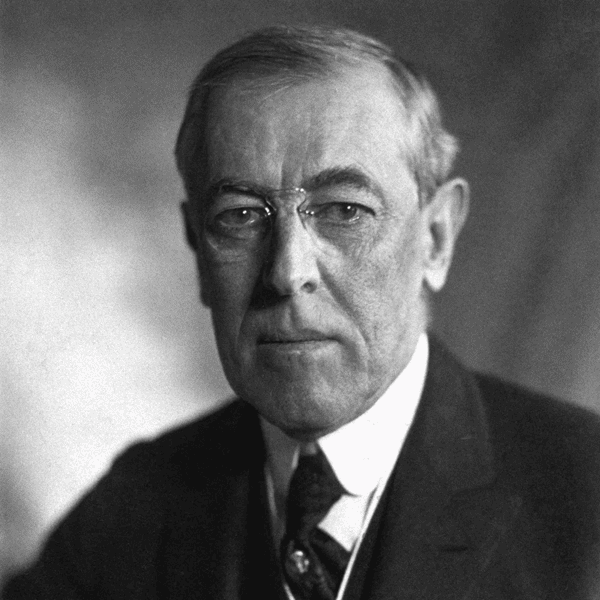From the American Historical Review 29:3 (April 1924)
Woodrow Wilson (December 28, 1856–February 3, 1924), president of the United States from 1913 to 1921, a distinguished historical scholar, and at the time of his death president of the American Historical Association, died in Washington on February 3, at the age of sixty-six. His first historical book, Division and Reunion, 1829–1889 (1893), though it was but a small text-book in a series, exerted perhaps a stronger influence upon thoughtful American students than any other historical text-book of its time, because it laid before them, for the first time, a convincing statement of the rationale of both parties to the Civil War and the accompanying conflicts. His George Washington (1896) was a fine example of eloquent, almost epic, biography. His History of the American People (1902), though it remade no considerable portions of the story and showed indifference to some aspects of it that in recent years have attracted more labor than the older themes of American political history, nevertheless was and remains a remarkable, in parts a brilliant performance, unsurpassed as a narrative for the general reader, the product of wide and careful reading, incisive but fair-minded thinking, and consummate literary skill. His public career has not yet passed fully into history; any attempt to express a judgment upon it would be premature, and at present inappropriate to these pages. But it cannot be inappropriate to remark to historical readers upon the powerful influence which his historical studies, and especially his wide knowledge of American and modern British history, exerted upon the course of his public conduct. Thus, at the climax of his career, the immense acclaim with which the populations of Europe greeted his arrival in December, 1918, was based on the perception that he saw the future of the world-order more clearly than did the run of nationally-minded statesmen; if it was so, it was because the profound student of history takes long views of human affairs where politicians take short views. American students of our subject may well remember with satisfaction which of our presidents have been the best versed in history; they may legitimately take a special pride in the greatness of the first who was a member of their profession, in his clear intellect, his masculine eloquence, his gifts of leadership, his lofty conception of his task, his stern devotion to duty, his indomitable courage.
Bibliography
Division and Reunion: 1829–1889 (Epochs of American History). New York: Longmans and Green, 1893.
Congressional Government, A Study in American Politics. Boston: Houghton, Mifflin and Company. 1885.
George Washington. New York and London: Harper & Brothers Publishers. 1896.
“On Being Human,” Atlantic Monthly, 1897.
The State: Elements of Historical and Practical Politics. Boston/New York/Chicago: D.C. Heath & Co., 1898.
A History of the American People. New York and London: Harper & Brothers Publishers. 1902.
Constitutional Government in the United States. New York: Columbia University Press, 1908.
The New Freedom. New York: Doubleday, Page & Co., 1913.
When a Man Comes to Himself. New York: Harper & Brothers, 1915.
“The Road Away from Revolution,” Atlantic Monthly, 1923.
